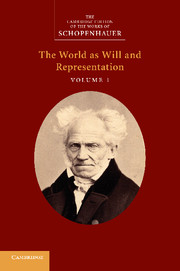Book contents
- Frontmatter
- Contents
- General editor's preface
- Editorial notes and references
- Introduction
- Notes on text and translation
- Chronology
- Bibliography
- THE WORLD AS WILL AND REPRESENTATION VOLUME 1
- Appendix: Critique of the Kantian Philosophy
- Variants in different editions
- Glossary of names
- Index
- References
Appendix: Critique of the Kantian Philosophy
Published online by Cambridge University Press: 06 December 2010
- Frontmatter
- Contents
- General editor's preface
- Editorial notes and references
- Introduction
- Notes on text and translation
- Chronology
- Bibliography
- THE WORLD AS WILL AND REPRESENTATION VOLUME 1
- Appendix: Critique of the Kantian Philosophy
- Variants in different editions
- Glossary of names
- Index
- References
Summary
C'est le privilège du vrai génie, et surtout du génie qui ouvre une carrière, de faire impunément de grandes fautes.
Voltaire[‘It is the privilege of true genius, and above all the genius who opens a new path, to make great errors with impunity.’ Siècle de Louis XIV, chap. 32].
It is much easier to indicate errors and mistakes in the work of a great mind than to give a clear and complete account of its value. This is because the mistakes are specific and finite and we can review each one, whereas it is a mark of genius that the excellence of its works is unfathomable and inexhaustible; they will not become obsolete, but will continue to be instructive for centuries on end. The perfected masterpiece of a truly great mind will always have so profound and far-reaching an effect on the entire human race that we cannot calculate how far geographically and temporally its illuminating influence will extend. This will always be the case, because however rich and accomplished the age might be in which the masterpiece appeared, genius will always rise up like a palm tree above the ground in which it is rooted.
But such profound and far-reaching effects cannot appear very quickly, because there is such a vast distance between the genius and the usual run of humanity.
- Type
- Chapter
- Information
- Schopenhauer: 'The World as Will and Representation' , pp. 441 - 566Publisher: Cambridge University PressPrint publication year: 2010

